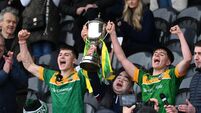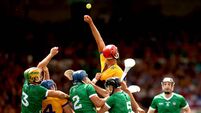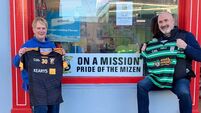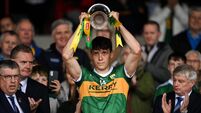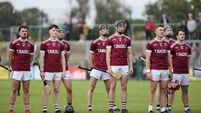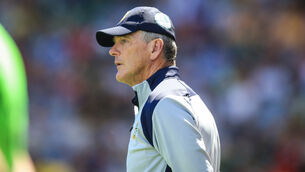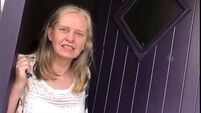Kieran Shannon: Primed for the pantheon — how great can Ballygunner become?

ELITE: Pauric Mahony of Ballygunner is tackled by Mike Casey of Na Piarsaigh.
Such is the litany of achievements that Christy Ring pulled off in what remains the most remarkable and influential hurling career of all, you’d have to be something of an anorak or an elderly Glen Rovers supporter or an embittered senior citizen of Cashel to know or recall that 58 years ago next week the great man from Cloyne featured in the first-ever Munster club championship hurling final.
Facing Ring and the Glen in that inaugural final was the dominant Waterford club team of the time: weeks earlier Mount Sion had denied an emerging team called Ballygunner a first-ever Waterford senior county title to win an 11th themselves in 12 years.
To describe the encounter between the Cork and Waterford champions as colourful and not just historic would be something of an understatement.
Although that Munster club championship was in many ways a considerable feat of organisation, being conceived and held six years before the advent of the provincial championships proper and the All Ireland club series, you could hardly say it ran along straightforward lines.
For one thing, while the trophy up for grabs was the 1964 Munster championship, featuring the province’s six-county champions of 1964 (as well as Galway’s), its final was only played in December 1965 – and so tumultuous a match that proved to be, the outcome wasn’t decided until Easter 1966.
The initial game had been played in Leahy Park, Cashel. “It was a horrific day,” the Glen’s Denis Coughlan would recall to Michael Moynihan of this parish many years later. “Rain, snow, the whole lot. A really dark December day.”
Aided by a strong wind the Glen had built up a commanding first-half lead. But with ten minutes to go and Mount Sion having whittled down the deficit to just three points, a Glen defender was able to calculate more than just what way the wind and game was going. When a ball was being contested in the mud-drenched goalmouth, he stood on it. The ball disappeared and with that a Glen supporter to appear onto the field, followed by a flood of his clubmen.
Cue pandemonium. Outrage – at the next meeting of the Cashel District Council it was suggested a contingent from Cork had brought knives and hatchets with them, prompting some Cork folk to boycott the Tipp town and use another pitstop on their way to Dublin for a number of years. And most importantly, a replay.
The game was duly re-fixed for Limerick the following Easter Sunday by which point everything was in the Glen’s favour: the match coincided with the 50th anniversary of the club, not just the 1916 Rising. Thanks to a goal of Ring’s, the Glen prevailed, ensuring that first provincial club title was handed to its still greatest-ever player and prompting excited but ultimately only speculative talk that the then 45-year-old was going to re-join the Cork panel for what proved to be the All-Ireland winning campaign of 1966.
The Munster club championship has seen many more remarkable players and teams and events since that chaotic afternoon in Cashel.
In 1968 Newmarket-on-Fergus became the first club to win back-to-back Munster titles, beating Ballygunner, who had just made their breakthrough in Waterford, in the final. Then Roscrea duly did the same, winning in ’69 and 70, with the added bonus of translating the latter into the first All Ireland club title there’s been.
The decade that ensued was a golden age for Munster club hurling, or to be more precise, Cork club hurling. From 1971 to 1980 whoever won Cork won Munster, and in seven of those 10 years, the All Ireland itself. The same three clubs did all the trophy lifting: Ring’s own beloved Glen with two All Irelands and two All Irelands, St Finbarr’s with two All Irelands and three Munsters, and leading the way Blackrock with three All Irelands and a stunning five provincial championships.
Such though was the competitiveness of the Cork championship back then none of them won back-to-back county or provincial titles.
Indeed it would take almost three full decades from Roscrea’s success for a club to retain Munster, with the St Joseph’s Doora-Barefield team backboned by Jamesie, Baker and McMahon managing to pull it in 1999.
It would take until last year for a team to repeat the feat; as magnificent as both Newtownshandrum and Na Piarsaigh were in winning an All-Ireland and multiple provincial titles, they each failed to string two Munster clubs back-to-back.
Now Ballygunner can go even one better than the Newmarket and Roscrea teams of the late 60s and that All-Star-laden Doora-Barefield team of the late ‘90s. Beat Clonlara on Sunday and they will become the first hurling team to win three Munster clubs in a row. Dr Crokes and Nemo have both done it in football but no one has done it in hurling.
As well as that, they will join Blackrock at the top of the roll of honour with five Munster titles.
Pull that off and you’d have to say they win any subsequent tiebreaker; with an astonishing nine runner-up finishes (seven since 1996 alone) to the Rockies’ mere two (the last in 2001 when they lost to a Ballygunner team winning their first) they have the edge there.
But not only would a win on Sunday seal the club’s magnificence; it would underline just how exceptional this team is. Already it is their sixth consecutive Munster final (either side of their 2018 breakthrough win, they lost to Na Piarsaigh in 2017 and Borrisoleigh by a point in 2019, not to mention the year to Covid in 2020).
Over the past three years they have hammered proud county champions, several of them Munster champions: Ballyea, Kilruane and Sarsfields all by 17 points, Kilmallock by 14.
No matter how many consecutive counties they rack up (10 and counting) or how long a layoff they have until their opening game in the provincial championship (two months in the case of this year’s demolition of Sars), they have become something never associated with a Waterford hurling team before: ruthless, not just relentless.
It is not a team as star-studded as those great Barrs and Rockies and Glen teams of the 70s or that Barefield team of the 90s or indeed their own breakthrough team of 2001 that featured all-time Waterford greats like Flynn and Hartley. But it is still a team with All Star talent and huge inter-county experience and remarkable continuity.
The back four of Stephen O’Keeffe, Tadhg Foley, Barry Coughlan and Ian Kenny have been constants on the team of 2018 and beyond; ditto Philip O’Mahony at centre back, Paraic O’Mahony at centre forwards, Peter Hogan on the wing, Shane O’Sullivan anywhere around the middle third. Conor Sheahan and Paddy Leavey have been the midfield tandem for the past five county finals; Dessie Hutchinson, Billy O’Keeffe and Kevin Mahony the inside trio for the past three years.
And they still have Harry Ruddle. They might need another All-Ireland to go with the one he won for them at the death against Ballyhale in 2022 to confirm they are the greatest Munster club team of all time, or at least since Ring lifted that cup after the chaos in Cashel.
But a third straight Munster would certainly elevate them above a tier of great champions in the pantheon.

